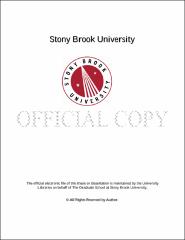| dc.identifier.uri | http://hdl.handle.net/11401/77537 | |
| dc.description.sponsorship | This work is sponsored by the Stony Brook University Graduate School in compliance with the requirements for completion of degree. | en_US |
| dc.format | Monograph | |
| dc.format.medium | Electronic Resource | en_US |
| dc.language.iso | en_US | |
| dc.publisher | The Graduate School, Stony Brook University: Stony Brook, NY. | |
| dc.type | Dissertation | |
| dcterms.abstract | In this dissertation, I analyze interracial sexual relationships represented in modern American literature, focusing mainly on ethnic texts written in the first half of the twentieth century. My work explores the ways in which these texts examine the intersectionality of race, gender, sexuality, and class in their discussions of “miscegenation.†This dissertation does not assume that literature written by people of color is always oppositional and resistant. Rather than reproducing that conventional and simplistic logic, my study investigates how ethnic literary texts bear and interrogate the traces of white values (or violence) and of white rhetorical strategies. In this way, I read American ethnic texts as cultural spaces in which U.S. racial discourse and modernity can be questioned and challenged or articulated and endorsed. The first two chapters examine W.E.B. Du Bois’s The Souls of Black Folk and Darkwater respectively. I argue that the discussion of interracial heterosexual exchange is central to both books, which present the normalization of interracial heterosexual desire as integral to black manhood and racial justice. I also address the ways in which Du Bois stigmatizes black women’s interracial heterosexual desire while normalizing black men’s interracial heterosexuality. The third chapter explores the dominant discourse of a mixed-race man’s sexuality under Jim Crow and its counter-discourse by examining James Weldon Johnson’s The Autobiography of an Ex-Coloured Man. The fourth chapter discusses Nella Larsen’s Passing to illustrate the pervasiveness of lynching in contemporary narratives about race and sexuality. The fifth chapter turns to a foundational novel within Filipino American literature, Carlos Bulosan’s America Is in the Heart, and analyzes the representation of interracial relations between white women and Filipino men in the novel. In the epilogue, I offer a brief meditation on Jessica Hagedorn’s Dogeaters, written in the late twentieth century, by exploring the novel’s narration of mixed-race Filipinos in order to trace a particular trajectory in which modern racist discourses have articulated and adapted themselves to maintain and facilitate U.S. imperialism on a global scale in a postmodern era. | |
| dcterms.available | 2017-09-20T16:52:52Z | |
| dcterms.contributor | Newman, Andrew | en_US |
| dcterms.contributor | Santa Ana, Jeffrey | en_US |
| dcterms.contributor | Walters, Tracey | en_US |
| dcterms.contributor | Balce, Nerissa. | en_US |
| dcterms.creator | KO, KANGYL | |
| dcterms.dateAccepted | 2017-09-20T16:52:52Z | |
| dcterms.dateSubmitted | 2017-09-20T16:52:52Z | |
| dcterms.description | Department of English. | en_US |
| dcterms.extent | 221 pg. | en_US |
| dcterms.format | Application/PDF | en_US |
| dcterms.format | Monograph | |
| dcterms.identifier | http://hdl.handle.net/11401/77537 | |
| dcterms.issued | 2015-05-01 | |
| dcterms.language | en_US | |
| dcterms.provenance | Made available in DSpace on 2017-09-20T16:52:52Z (GMT). No. of bitstreams: 1
KO_grad.sunysb_0771E_12470.pdf: 2640035 bytes, checksum: 58891d3fa69c8ccbb3b0c19f25205ce0 (MD5)
Previous issue date: 2015 | en |
| dcterms.publisher | The Graduate School, Stony Brook University: Stony Brook, NY. | |
| dcterms.subject | American literature | |
| dcterms.title | Race, Sex, and Interracial Intimacy in American Literature | |
| dcterms.type | Dissertation | |

